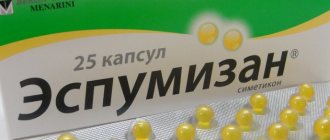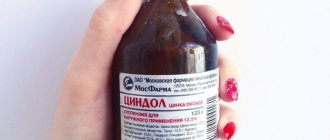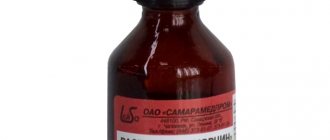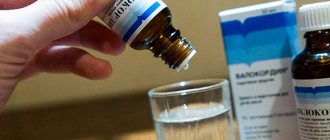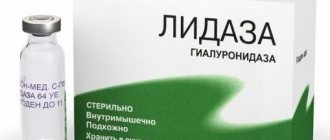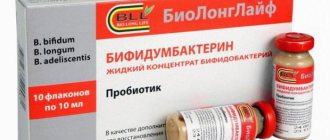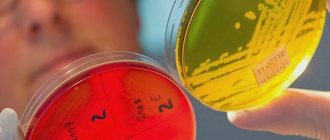After birth, the child experiences adaptation of the digestive tract to the new conditions of postnatal development. This is manifested by colic, constant regurgitation, bloating and accumulation of gases in the abdomen. All this leads to the fact that the child sleeps poorly and gains weight. To eliminate these unpleasant symptoms, doctors recommend giving newborns Bifidumbacterin.
Bifidumbacterin in vials can be given to children from the first days of life
Pharmacological properties
Bifidumbacterin is a probiotic that is an antagonist of a large number of pathogenic and opportunistic intestinal microorganisms, such as:
- Staphylococcus aureus;
- shigella;
- salmonella;
- Escherichia coli;
- Proteus;
- Klebsiella;
- a number of yeast-like fungi.
It normalizes the microflora of the intestines and vagina, digestion in the intestines, activates metabolism, and increases the nonspecific resistance of the body.
Normal intestinal microflora is a natural biosorbent that decomposes toxins entering from the outside or synthesized in the body into non-toxic components; it takes part in the synthesis of some vitamins (cyanocobalamin, folic acid, vitamin K).
https://youtu.be/JUybQ0pU9_0
Indications and contraindications
Indications
Bifidumbacterin is prescribed to newborns:
- for the prevention and treatment of dysbiosis of the digestive tract caused by various reasons, including stomach and duodenal ulcers, inflammation of the liver, pancreas, gall bladder, allergies, taking antibiotics, hormones, non-steroidal anti-inflammatory drugs, stress, radiation and chemotherapy;
- to prevent the development of hospital infections and dysbiosis in children who often suffer from acute respiratory viral infections;
- for the prevention of disturbances of intestinal microflora before and after surgical treatment of the digestive organs;
- with early transfer of the baby to artificial feeding;
- weakened children who have anemia, rickets, protein-energy deficiency, allergic diathesis;
- if infectious and inflammatory diseases are observed in infants, such as pneumonia, purulent-septic processes.
In addition, Bifidumbacterin is prescribed to newborns if the child has:
- acute intestinal infections, including those caused by rotaviruses, Shigella, Salmonella;
- food poisoning, including those caused by staphylococci;
- chronic stool disorder or constipation that developed due to prolonged use of antibiotics;
- malabsorption syndrome.
Contraindications
Bifidumbacterin should not be prescribed to a newborn if he has an individual intolerance to the drug. In this case, an allergic reaction may occur, which requires stopping the medication and immediately contacting a doctor to prescribe antiallergic drugs and further adjust the treatment regimen.
Important! Some dosage forms of Bifidumbacterin may contain lactose, so they are contraindicated in children suffering from lactase deficiency.
With this disease, the body cannot digest dairy products. It can be manifested by upset stools; they become liquid, foamy, and have a sour odor. A newborn may experience anxiety during or immediately after feeding, bloating, colic, and poor weight gain. All these symptoms are not specific and can develop with other diseases of the digestive tract, including dysbacteriosis. That is why Bifidumbacterin can be given to a newborn only if it has been prescribed by a doctor. Only a doctor can determine the need for its prescription, as well as select the correct dosage.
The functioning of the gastrointestinal tract in an infant
The importance of proper functioning of the digestive system in general and the intestines in particular cannot be overestimated.
Most nutrients are absorbed there - therefore, when the intestines do not work properly and the body lacks energy, bad mood, weakness and ailments are guaranteed. This did not bypass newborns either - for barely born babies, the proper functioning of the gastrointestinal tract is no less important than for adults! At the slightest disruption in his work, the baby will develop bloating and colic, which causes a lot of anxiety for both him and his parents.
The work of the gastrointestinal tract is based on the interaction of bacteria. Entering the body with mother's milk, beneficial bacteria form colonies and protect their habitat from uninvited guests: they envelop the intestines with a protective film that promotes proper intestinal function, and help form nerve endings for receiving food other than milk or infant formula.
However, when there are not enough beneficial bacteria in the body, the baby begins to experience spasmodic colic. The food that enters the body does not have time to be completely processed, it begins to ferment and release gas bubbles, causing a painful reaction.
The activity of the gastrointestinal tract affects the entire body of a small person, so its proper functioning is the key to your baby’s health. And when there are not enough beneficial bacteria in it, Bifidumbacterin for newborns and infants is the first assistant. The active component of the drug is Bifidobacterium bifidum.
Rules for taking Bifidumbacterin
Useful article? Share the link on VKontakte
Bifidumbacterin is available in several dosage forms:
- in bottles and ampoules in powder form for the preparation of a solution for oral administration and topical use;
- in sachets, which also contain powder for the preparation of a solution for oral administration and topical use;
- in vaginal or rectal suppositories, allowed for use in children over 3 years of age;
- in tablets, it is also acceptable to use in children who are already 3 years old, in the case when the child can swallow the tablet.
Bifidumbacterin can be given to a newborn in powder form.
Important! Despite the fact that Bifidumbacterin is sold without a prescription, it can only be given as prescribed by a specialist.
Only a doctor can prescribe a drug after examining the child and familiarizing himself with stool tests, so when a newborn has problems with the digestive tract, you should immediately seek medical help. This will help avoid progression of the disease. You should also not interrupt the course of taking the medication on your own. In addition, the doctor can tell which Bifidumbacterin is best for newborns.
Before giving medication to a child, you need to know how to dilute Bifidumbacterin.
If the baby is bottle-fed, then the powder must be mixed with the liquid part of the food, preferably something made from fermented milk or boiled water at room temperature. For breastfed babies, the lyophilisate can be diluted in breast milk. The volume of liquid can vary from 30 to 50 ml, unless of course the doctor prescribes other proportions for dilution.
Important! The dilution liquid should not be higher than 40 degrees, otherwise the living bacteria will die.
The medicine is given 20-30 minutes before meals, and it is also possible to give it to the child right before feeding.
Some parents whose children do not suck a bottle do not know how to give Bifidumbacterin to a newborn. This can be done simply: even premature babies who are unable to breastfeed can drink from a spoon. If parents are afraid to give medicine in this way, then they can give it from a pipette or from a syringe. To do this, you need to disconnect the needle, it will not be needed, draw the medicine into the syringe and give it drop by drop or carefully pour it into the child’s mouth.
If the child does not suck a bottle, you can give him Bifidumbacterin using a syringe
The duration of therapy is determined by the doctor individually, usually the preventive course varies from 7 to 10 days, and for therapeutic purposes the drug is prescribed for 17-20 days; after a month's break, Bifidumbacterin can be prescribed by the doctor again.
Important! Once Bifidumbacterin is diluted, the prepared solution cannot be stored. Undiluted lyophilisate should be stored in the refrigerator at a maximum temperature of 10⁰C. The shelf life of the medicinal product is 12 months; after its expiration, the medication cannot be taken and must be disposed of.
It must be remembered that Bifidumbacterin for oral administration should not be taken while taking antibiotics, as they reduce the effectiveness of treatment.
But the effects of Bifidumbacterin are enhanced if taken in parallel with vitamins, especially when taken with B vitamins.
If you follow all the doctor’s recommendations, the newborn’s condition should improve in a week: stool and digestive tract function will normalize, the amount of gases will decrease, and bloating will go away.
If after this time the child does not feel better, then you need to consult a doctor to adjust the treatment regimen.
Basic information
https://youtu.be/hFfADvP5l6U
The trade name Bifidumbacterin is a group of a number of commercial names for the same medicine. The active component of all types of the drug and its forms is live bifidobacteria of varying concentrations. For convenience, a generalized name of the same name is used.
They are identical to representatives of healthy human microflora. Taking the drug promotes their intensive reproduction and distribution throughout the intestines.
Due to this, a number of positive effects are achieved:
- reduction in the concentration of pathogenic microbes (opportunistic and pathogenic flora);
- elimination of imbalance of intestinal microflora (dysbacteriosis), prevention of its relapse;
- normalization of digestive processes due to the elimination of diarrhea, difficult defecation, flatulence, increased gas formation;
- improvement of intestinal motility and gastrointestinal motility;
- strengthening vitamin-synthesizing abilities (production of water-soluble vitamins due to the activation of beneficial microbes);
- activation of the body's defenses;
- regulation of the balance of pathogenic and non-pathogenic microorganisms after an infection, antibacterial treatment.
Bifidumbacterin for newborns is used for therapeutic purposes, less often - to prevent pathologies. It is effective for imbalance of intestinal microflora, increased gas formation, diathesis, and iron deficiency conditions. Bifidumbacterin is often prescribed during the transition of a baby to formula milk.
We suggest you read: When should you start drinking duphaston during pregnancy?
Analogs
In addition to Bifidumbacterin, you can find its analogues in the pharmacy, which also contain beneficial bacteria and are intended to normalize the intestinal microflora:
- Bifiform baby. The drug is available in the form of a powder and an oil solution to make a suspension. The drug can be given from birth. To prepare the suspension, you need to turn the lid so that the oil and powder mix together. You can give the drug to a newborn using the pipette built into the lid. After opening, the bottle can be stored at a maximum temperature of 8 degrees, the medicine should be used within 2 weeks. An unopened bottle can be stored at a temperature not exceeding 25 degrees.
- Linex, available in capsules. Before giving the medicine to a newborn, you need to open the capsule, dissolve its contents in water, breast milk and give it to the child from a spoon.
One of the analogues of the drug Bifidumbacterin is Linex
- Primadophilus for Children is available in powder form, which can be used in children from the first days of life to 5 years. It contains bifidobacteria and lactobacilli. Give the dietary supplement 10 minutes before the first feeding. The powder is placed in a dry, clean spoon and dissolved in at least 10 ml of water, breast milk, adaptation formula or any other liquid. The duration of the appointment is selected by the doctor individually, depending on the child’s well-being. On average, the course of treatment can vary from 2 to 4 weeks.
- Hilak forte. The drug is available in drops and can be used in children from birth. One of the disadvantages of the drug is the characteristic sour taste, which not all newborns like. The drug is not recommended to be given simultaneously with milk and dairy products. After opening the bottle, the medication can be used for 6 weeks.
- Acipol is available in capsules. According to the instructions, it can be used in children older than 3 months. The drug is given with food. First you need to open the capsule and dissolve its contents in boiled chilled water or milk.
- Bifikol is produced in the form of a lyophilisate in bottles. Allowed for use in children over 6 months of age. Before giving the powder to a child, the contents of 1 bottle must be dissolved in a teaspoon of liquid.
Only a doctor should select an analogue of Bifidumbacterin, since each of them has its own indications and contraindications for use, and its own treatment regimen.
The little one's belly is grumbling. Screams, curled legs, colic - parents don’t sleep, the baby suffers. It’s good when you can cope with this trouble without the help of medications. But in some cases you have to resort to specialized means.
Analysis
A reduced content of bifidobacteria in feces is most often determined by examining the intestinal microflora if dysbacteriosis is suspected. This analysis is not widely used in ordinary medical practice due to the length and complexity of its implementation in outpatient departments.
To obtain accurate test results, it is necessary to ensure rapid delivery of stool (no more than 3 hours) in a sterile container to the laboratory. It is advisable to cool the collected biomaterial (10 g), but should not freeze it. Enemas and barium preparations should not be used. Antibiotics should be stopped 12 hours before collection. Also, a few days before the test, stop using laxatives and rectal suppositories.
It usually takes about a week to count the number of microbes. During this time, the contents of the container, sown on a nutrient medium under thermostatic conditions, germinate, and the specialist counts the colonies of bacteria.
Bifidumbacterin. Pharmacological characteristics
Bifidumbacterin is a drug that affects the functioning of the gastrointestinal tract.
Bifidumbacterin - refers to substances that affect the gastrointestinal tract. The drug contains 107 live microorganisms - bifidobacteria - in one dose.
The drug is produced in the form of a dry powder for preparing a solution. In appearance, “Bifidumbacterin” powder is beige crystals of varying degrees of intensity. A grayish tint of the drug is allowed. This is not a sign of damage to the product.
In addition to the powder form, they produce ready-made solutions, suppositories for vaginal or rectal administration, and capsules. But for toddlers from 0 to 12 months, these forms are not used. When dissolved in water, an opaque suspension with a characteristic odor and taste is formed.
How does the drug work? The normal microflora of the gastrointestinal tract suppresses opportunistic microorganisms, improves the general condition of the body, and helps increase the immunity of the little man. When is Bifidumbacterin prescribed? The drug is prescribed orally for the treatment of gastrointestinal pathologies and intravaginally in gynecological practice. Bifidumbacterin is prescribed to children in the following cases:
- Acute gastrointestinal pathologies of unknown origin as part of complex therapy.
- Infectious intestinal diseases - dysentery, salmonella, E. coli, staphylococcus.
- Long-term dysfunction of the intestine after acute pathologies.
- In combination in the treatment of weakened, premature children diagnosed with pneumonia or sepsis for the prevention of ulceration and necrosis of the intestinal mucosa.
- Toddlers born before 38 weeks of pregnancy.
- Children who received antibiotics or antibacterial treatment from the first days of life.
- Toddlers whose mothers have been treated for mastitis and are restoring lactation or have cracked nipples.
- Babies whose pregnancy was accompanied by inflammatory diseases of the urogenital tract in women.
- Weakened toddlers, children diagnosed with rickets, whooping cough, allergic reactions of unknown etiology.
- In babies receiving artificial formula or donor breast milk.
Mechanism of action
This medicine is aimed at optimizing intestinal balance. The indication for use of the product is a situation where the body lacks beneficial bacteria.
Bifidumbacterin for children is prescribed to improve intestinal function and restore its microflora. In addition, the product has immunomodulatory properties.
The medicine contains live bifidobacteria. When a baby is in the womb, its intestines are sterile. After birth, the organ is populated with microflora similar to the maternal one. It is recommended to give Bifidumbacterin to a newborn in order to help the required number of beneficial bacteria develop.
Violations of the child's intestinal functions are associated with a deficiency of necessary microorganisms. Through the use of the drug, it is possible to achieve a mild and natural effect on the child’s body. Therefore, taking the drug is allowed from the first day of life.
How to prepare a medicinal solution? Method of diluting the drug
Bifidumbacterin should be diluted with warm water.
1 bottle of the drug contains 5 doses of beneficial microflora. To prepare the solution, you need boiled water at room temperature.
Important! The water should not be higher than 37 degrees Celsius. Do not use boiling water, since “Bifidumbacterin” is a living culture and at high temperatures lacto and bifidobacteria die. Method of diluting the drug:
- Take a clean cup or glass and a teaspoon.
- Measure water at the rate of 1 teaspoon per 1 dose of the drug. Thus, 1 bottle of Bifidumbacterin will require 5 teaspoons of water.
- Pour water from a glass into a bottle with powder and stir thoroughly.
- Take the prescribed number of doses.
- The drug is not stored in diluted form. If you need to take fewer doses, it is recommended to divide the dry powder. To do this, use a clean spatula. And then dilute it with the required volume of water.
- The remaining powder should be stored in a cool place, carefully sealing the bottle with a stopper.
- Take the solution half an hour before meals. For infants, the drug is given immediately before feeding.
Effective dosages
The dosage of bifidumbacterin depends on the age of the patient.
The effective dosage of Bifidumbacterin depends on the age of the toddler, the severity of the pathology and concomitant diseases. Intestinal ailments.
- 0–6 months – 1 bottle (5 doses) 2 times a day;
- 7–12 months – 3 bottles 3 times a day.
- Newborns in the maternity hospital who are at risk - 2.5 ml 2 times a day.
- Sepsis, infectious diseases in children under 12 months of age - 1 bottle 3 times a day with other drugs in combination. If there is a threat of necrotic changes in the intestines, the effective dosage is increased to 4 bottles per day.
- If the toddler is breastfed, it is recommended that the solution be applied to the mother’s nipples immediately before feeding. Use 5 doses of the drug.
- The duration of treatment varies depending on the severity of the disease. The standard course is from 14 to 28 days. It can be extended up to 3 months.
Treatment course for newborns
The duration of treatment is determined by the attending physician. Usually the drug is taken until the condition improves. For preventive purposes, bifidumbacterin for newborns is prescribed for a week. If the condition is severe and digestive problems are serious, then the course of treatment can last two weeks or more. To get rid of colic, a two-week course is usually enough.
Contraindications and side effects of Bifidumbacterin
Bifidumbacterin has no contraindications.
There are no contraindications to taking lactobacilli solution. Side effects are not described in the literature.
But, if the little one’s condition worsens or any suspicious symptoms appear, then you should consult a doctor and reconsider the prescriptions. Be careful! Before using the drug in the treatment of toddlers, you need to consider the following points:
- “Bifidumbacterin” should be stored and transported only at temperatures from +2 to +8 degrees;
- do not use the medicine if the bottle is damaged; dried mass in packaging. It is visible to the naked eye - dark brown color,
- decrease in volume. This drug is not taken;
- do not use the drug after the expiration date;
- do not exceed recommended dosages;
- If any signs of intolerance to the drug appear, you should immediately report the baby’s reaction to the pediatrician.
What to replace the drug with?
Lactobacterin is an excellent drug to replace bifidumbacterin.
There are situations when it is impossible to find the prescribed medicine. Or at re-registration, sometimes it’s simply not available in the nearest pharmacies. What can you give to toddlers instead of Bifidumbacterin?
- Lactobacterin is a dry powder for the preparation of suspensions. Contains acidophilus bacteria.
- Acipol in capsules contains lactobacilli and kefir bacteria.
- Hilak forte in drops is an aqueous solution of waste products of normal microflora.
- Bifiform Baby is an oil solution containing several strains of bifidobacteria.
- Linex - in powder or capsules - is the normal microflora of the human gastrointestinal tract.
Enterozermina in solution - can be used from the 21st day of life. The indications for prescribing these drugs are the same as for Bifidumbacterin:
- normalization of microflora;
- maintenance course after antibiotic therapy;
- various intestinal diseases;
- infantile colic;
- flatulence.
Contraindications – only individual hypersensitivity to the components of the drug.
